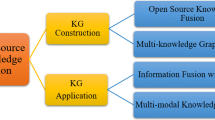Abstract
Sometime Query Answering Systems (QAS) for a Distributed Autonomous Information System (DAIS) may fail by returning the empty set of objects as an answer for a query q. Systems in DAIS can be incomplete, have hierarchical attributes, and the semantics of attributes and their values may differ between sites. Also, if there are no objects in S matching q, the query may fail when submitted to S. Alternatively, QAS for S may try to relax the query q as it was proposed in T. Gaasterland (IEEE Expert, 12(5), 1997, 48–59), P. Godfrey (International Journal of Cooperative Information Systems, 6(2), 1997, 95–149) and W. Chu et al. (Journal of Intelligent Information Systems, 6(2/3), 1996, 223–259). It means that q can be replaced by a new more general query. Clearly, the goal is to find possibly the smallest generalization of q which will not fail in S. Smaller generalizations guarantee higher confidence in objects returned by QAS. Such QAS is called cooperative (only one site is involved). Queries may also fail in S when some of the attributes listed in q are outside the domain of S. To resolve this type of queries, assuming that S is a part of DAIS, we may extract definitions of such attributes from information systems residing at some of the remote sites for S and next use them to approximate q in S. In order to do that successfully, we assume that all involved systems have to agree on the ontology of some of their common attributes Z.W. Raś and A. Dardzińska (Information Systems International Journal, 29(1), 2004, 47–58; Proceedings of FQAS 2004 Conference, LNCS/LNAI No. 3055, 2004, pp. 125–136); Z.W. Raś and S. Joshi, Fundamenta Informaticae Journal, 30(3/4), 1997, 313–324. QAS based on the above strategy is called collaborative (minimum two sites are involved). Similarly, a query may fail in S when the granularity of an attribute used in q is finer than the granularity of the same attribute in S. This paper shows how to use collaboration and cooperation approach to solve failing queries in DAIS assuming that attributes are hierarchical. Some aspects of a collaboration strategy dealing with failing query problem for non-hierarchical attributes have been presented in Z.W. Raś and A. Dardzińska (Information Systems International Journal, 29(1), 2004, 47–58; Proceedings of FQAS 2004 Conference, LNCS/LNAI No. 3055, 2004, pp. 125–136).
Similar content being viewed by others
References
V. R. Benjamins, D. Fensel, and A. G. Prez, “Knowledge management through ontologies,” in Proceedings of the 2nd International Conference on Practical Aspects of Knowledge Management (PAKM-98), Basel, Switzerland, 1998.
W. Chu, H. Yang, K. Chiang, M. Minock, G. Chow, and C. Larson, “Cobase: A scalable and extensible cooperative information system,” Journal of Intelligent Information Systems 6(2/3), 1996, 223–259.
A. Dardzińska and Z. W. Raś, “Rule-based chase algorithm for partially incomplete information systems,” in Proceedings of the Second International Workshop on Active Mining (AM’2003), Maebashi City, Japan, October 2003, pp. 42–51.
A. Dardzińska and Z. W. Raś, “On rules discovery from incomplete information systems,” in Proceedings of ICDM’03 Workshop on Foundations and New Directions of Data Mining, T.Y. Lin, X. Hu, S. Ohsuga, C. Liau, Melbourne, Florida, IEEE Computer Society, 2003, pp. 31–35.
A. Dardzińska and Z.W. Raś, “Chasing unknown values in incomplete information systems,” in Proceedings of ICDM’03 Workshop on Foundations and New Directions of Data Mining, T.Y. Lin, X. Hu, S. Ohsuga, and C. Liau (eds.), Melbourne, Florida, IEEE Computer Society, 2003, pp. 24–30.
A. Dardzińska and Z. W. Raś, “Extracting rules from incomplete decision systems: System ERID,” in Foundations and Novel Approaches in Data Mining, T.Y. Lin, S. Ohsuga, C.J. Liau, and X. Hu (eds.), Advances in Soft Computing, Springer, 2005, pp. 143–154.
D. Fensel, Ontologies: A Silver Bullet for Knowledge Management and Electronic Commerce, Springer-Verlag, 1998.
T. Gaasterland, “Cooperative answering through controlled query relaxation,” IEEE Expert 12(5), 1997, 48–59.
P. Godfrey, “Minimization in cooperative response to failing database queries,” International Journal of Cooperative Information Systems 6(2), 1997, 95–149.
N. Guarino (ed.), Formal Ontology in Information Systems, IOS Press: Amsterdam, 1998.
N. Guarino and P. Giaretta, “Ontologies and knowledge bases, towards a terminological clarification,” in Towards Very Large Knowledge Bases: Knowledge Building and Knowledge Sharing, IOS Press, 1995.
Z. Pawlak, Rough Sets-Theoretical Aspects of Reasoning about Data, Kluwer: Dordrecht, 1991.
Z. Pawlak, “Information systems—theoretical foundations,” Information Systems Journal 6, 1991, 205–218.
Z. W. Raś, “Dictionaries in a distributed knowledge-based system,” in Concurrent Engineering: Research and Applications, Conference Proceedings, Pittsburgh, Penn. Concurrent Technologies Corporation, 1994, pp. 383–390.
Z. W. Raś and A. Dardzińska, “Ontology based distributed autonomous knowledge systems,” Information Systems International Journal, Elsevier, 29(1), 2004, 47–58.
Z. W. Raś and A. Dardzińska, “Query answering based on collaboration and chase,” in Proceedings of FQAS 2004 Conference, Lyon, France, LNCS/LNAI, No. 3055, Springer-Verlag, 2004, pp. 125–136.
Z. W. Raś and S. Joshi, Query approximate answering system for an incomplete DKBS, Fundamenta Informaticae Journal, IOS Press, 30(3/4), 1997, 313–324.
J. F. Sowa, “Ontology, metadata, and semiotics,” in Conceptual Structures: Logical, Linguistic, and Computational Issues, B. Ganter & G.W. Mineau (eds.), LNAI No. 1867, Springer-Verlag, 2000, pp. 55–81.
J. F. Sowa, Knowledge Representation: Logical, Philosophical, and Computational Foundations, Brooks/Cole Publishing Co. Pacific Grove, CA, 2000.
J. F. Sowa, “Ontological categories,” in Shapes of Forms: From Gestalt Psychology and Phenomenology to Ontology and Mathematics, L. Albertazzi (ed.), Kluwer Academic Publishers: Dordrecht, 1999, pp. 307–340.
S. Staab and R. Studer (eds.), Handbook on Ontologies, International Handbooks on Information Systems, Springer, 2004.
E. Suzuki and Y. Kodratoff, “Discovery of surprising exception rules based on intensity of implication,” in Proceedings of the Second European Symposium, PKDD98, LNAI 1510, Springer-Verlag, 1998, pp. 10–18.
G. Van Heijst, A. Schreiber, and B. Wielinga, “Using explicit ontologies in KBS development,” International Journal of Human and Computer Studies 46(2/3), 1997, 183–292.
Author information
Authors and Affiliations
Rights and permissions
About this article
Cite this article
Raś, Z.W., Dardzińska, A. Solving Failing Queries through Cooperation and Collaboration. World Wide Web 9, 173–186 (2006). https://doi.org/10.1007/s11280-005-3044-5
Published:
Issue Date:
DOI: https://doi.org/10.1007/s11280-005-3044-5




